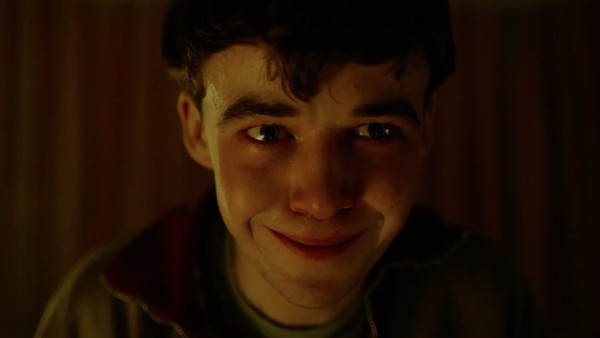Ghost Stories: Jeremy Dyson Interview - Magic, The Golden Age Of Horror & Unexpected Backlash

JB: Without spoiling the ending for people who will read this, it wraps up in a very satisfying way that pays off little details and plot threads that kind of explain a lot of the horror that went before. Was there ever any worry that the final resolution - the final scene - would take away some of the mystery of the horror, or were you always confident that it would make it more pronounced on second and third viewings?
JD: Well, it was a version of what had happened in the stage show, while the mechanics of the end were different, it was still revealing the same thing. So we had a sense of how that played with audiences because it had run for so long with so many different audiences. So, if anything we were probably a bit surprised the other way, because the film was a bit more divisive I think than we were aware of the stage play being, because we got quite a bit more from people who were a bit put out from the ending, who felt cheated or whatever. I don't remember that so much from the stage play. Perhaps you come across more of that feedback online because film communities online are quite different. So if anything, yes, the fact that there were some people it might not have worked for is something we hadn't considered.
JB: Obviously you're a huge fan of the genre - I think that goes without saying - but I think we are seeing some really interesting work in the genre recently, from the likes of The Babadook, to Hereditary and now Ghost Stories. How do you think the horror landscape has changed, even from when Ghost Stories debuted back on stage back in 2010?
JD: There's no question, certainly, that since the millennium, we're in a golden age of supernatural stuff. I wrote a book in the mid-nineties about supernatural horror, Bright Darkness, which was very much decrying the decline of supernatural horror, because they'd really stopped happening and dropped off the radar for a long time. Then around the late nineties with The Blair Witch Project and The Sixth Sense, suddenly they're back on the radar, and I think from there on in it's amazing how much has happened compared to before.
You know, because you had all the J-Horror stuff - Ringu, Dark Water and everything that came with that - and that infected Hollywood. And then you had great stuff coming out of Spain, Europe. And suddenly, then I guess the thing that happens around the time of the stage show is Blumhouse making its name with Paranormal Activity and Insidious and making a brand, and they're amazing and creative. It's not a trashy product, many of them were really great films in the genre. So it's an amazing time, I think, with so much stuff out there. It's really interesting to think why that might be? When I was writing Bright Darkness there were so few mainstream Hollywood ghost stories. You know, in the history of filmmaking, you have things like Dead of Night, but the amount of ghost stories you could kind of count on one hand.
JB: I think we've sort of seen audiences embrace these stories which is really good, because I think your movie in particular sort of relishes in the "super" supernatural side of it. But you have those big supernatural set-pieces which are always exacerbated by real human fears as well, like a character lying to their parents about passing their drivers test. Does that ground the more supernatural set-pieces in a way?
JD: That's very much a literary thing. You know, in terms of, the best fiction version of ghost stories, which are something I've been passionate about for years and years. You can draw a line all the way back to M.R. James, but certainly in terms of contemporary stuff you're thinking, in this country, Ramsey Campbell, Robert Aickman. They were writers who played that game by writing silly stuff, specifically someone like Ramsey Campbell, telling you this naturalistic, contemporary detail and making these recognisable characters. It then made the supernatural stuff much, much scarier, because it felt so much more real. And I think we were very much looking to that as much as we were cinematic stuff. And, I mean I've written fiction stories which have tapped into that psychology of horror, and Andy is equally fascinated by that.
JB: That's brilliant, thank you. Just a very quick one to wrap things up: I wanted to know, as a director and a writer, how do you want an audience member to feel after coming out of a horror movie? What's the perfect state they should be in?
JD: Well, first and foremost you absolutely want them to have had a really great ride. You know, because we're always approaching it as, what would we want? So that's the first thing, you want them to really enjoy the story and have taken them on a ride where they don't know where it's going. And the second thing is... hopefully leaving them with something to chew on. Just in terms of, there's something in there to think about. Maybe not in a "think" way, but again, you hope that that film is about something, rather than just being a good funhouse ride.
JB: Yeah, I think Ghost Stories has definitely achieved that. Anyway, that's all I have, thank you for talking with me today!
JD: Thanks Josh, bye.
You can catch Ghost Stories for yourself when it hits Blu-Ray and DVD on August 27, 2018.